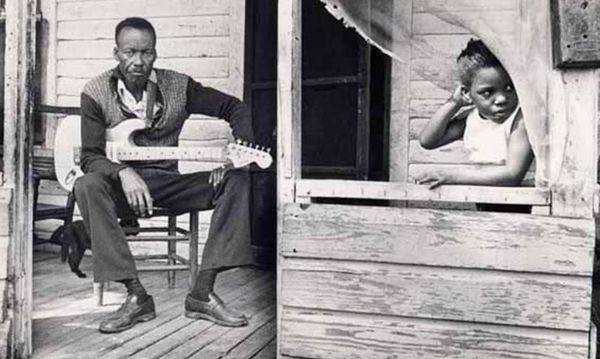Eye For Film >> Movies >> Feel Like Going Home (2003) Film Review

The debt owed to past blues musicians by the giants of the rock industry - Bob Dylan, Jimi Hendrix and Led Zeppelin among others - becomes apparent when you listen to their music. Less well known is the story of how that debt came about, how the music of poor black agricultural workers came to influence that of urban rock musicians.
In this series of seven short films/documentaries, entitled The Blues, Martin Scorsese puts this right by telling the story of the blues from its African roots right through to its influence upon modern music. His masterstroke is to engage seven directors to produce these films, thus ensuring that the approach is always varied and each film is a personal homage to the music. The choice is well-considered, since most have directed movies about music, or ones where music plays a critical role - Scorsese himself (The Last Waltz), Clint Eastwood (Bird), Wim Wenders (Buena Vista Social Club and Paris, Texas) and Charlie Burnett (Killer of Sheep) - and they clearly care passionately about their subject.

This body of work will set the standard for any similar ventures in the future, although Francis Ford Coppola's rumoured trilogy on the History Of Boy Bands will make interesting viewing and could run Scorsese close.
Feel Like Going Home is Scorsese's personal contribution. It is the keynote film in the series and is an outstanding introduction to the blues for anyone who wants to understand the roots of the music and see it performed by some of the most revered names in its history. It is beautifully put together, with a deft combination of historical footage of black workers and a background of original soundtracks, together with past performances of some of the greatest blues musicians - John Lee Hooker, Muddy Waters, Leadbelly, Son House and others.
The framework of the film is a journey - Scorsese describes it as a pilgrimage - by young blues musician, Corey Harris, to discover the roots of the music and, in doing so, he gets the opportunity to interview and play with some of the great living bluesmen, including Taj Mahal and Willie King.
This journey back to the Mississippi Delta and his interviews with these surviving musicians seems, at times, like an extension to the original cataloguing of the music in the Forties by John and Alan Lomax, who captured the original blues greats on film for the American Library of Congress. Scorsese makes good use of these historical documents that first brought the blues to a wider audience.
It would have been easy for Scorsese to make a film comprising solely of great performances but, fortunately, he goes in search of the roots of the music. In doing so, he takes us into the world of flute and drum music, a variation of blues that many will not have come across, and then to Africa, where Harris believes the origins of the blues lie. This transition from the American Deep South to Mali in North West Africa is not an easy one and gives the movie a slightly disjointed feel, even though the subject matter demands that we go. There is also an annoying habit of subtitling many of the musicians when they are performing, which is unnecessary since the sound recordings and diction are fine.
But these are minor complaints. This is a magnificent film. Its simple structure of archive performances and interviews with surviving musicians, recalling their music, their gigs and their memories of these legendary performers, has a languidness and easy pace that reflects the music whose story it tells.
The interviews are often filmed early in the morning or late in the afternoon, when the light is softer, which adds to the laid back feel of the movie. The camera is never obtrusive; it's the music and performances that dominate.
Reviewed on: 01 Aug 2004If you like this, try:
In Search Of Blind Joe Death: The Saga Of John FaheySophiatown
What Happened, Miss Simone?


















